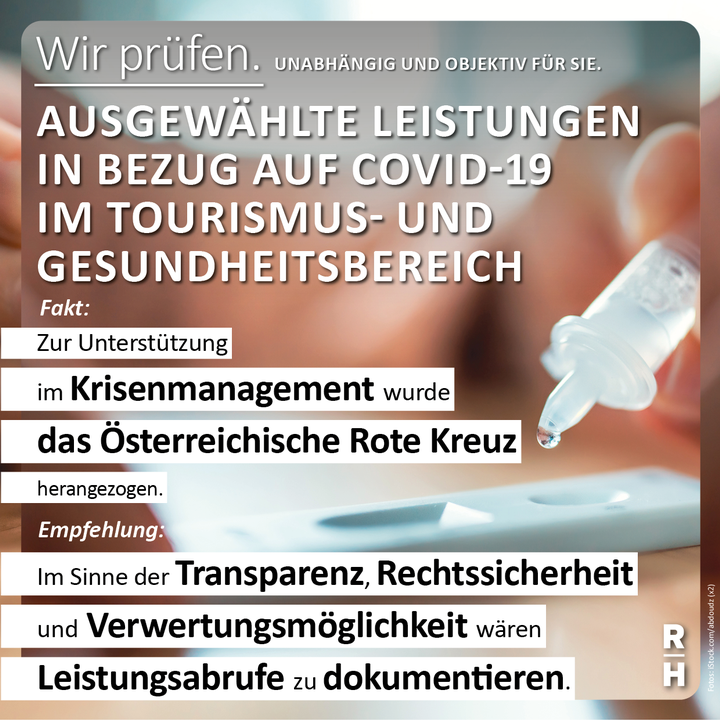Shortfalls in the award and documentation of selected services in the Federal Ministries of Tourism and Health

The Austrian Court of Audit (ACA) took a close look at the COVID-19 test programme “Sichere Gastfreundschaft” (“Safe Hospitality”) and at direct awards of advisory services.
The ACA’s auditors have found that the provision of advisory services was poorly documented and implemented in the Federal Ministry of Health. Furthermore, they criticize the design of the “Safe Hospitality” COVID-19 test programme of the Federal Ministry of Tourism. These are two of the key findings of today’s published audit report on selected purchased services related to the COVID-19 pandemic. The ACA audited the period of 2020 until the end of the first half of 2021 and assessed the services of the Federal Ministry of Tourism amounting to EUR 140 million as well as advisory services purchased by the the Ministry of Health accounting for EUR 2 million.
In doing so, the ACA acknowledged the fact that due to the dynamic development of the COVID-19 pandemic – in particular at its onset in spring 2020 – the Federal Ministries of Tourism and Health were under great time pressure.
Contract awards instead of funding for the test programme
Although the ACA assessed the objective of the COVID-19 test programme in the tourism sector as expedient, it would have been more favourable, from a legal perspective, to initiate a procurement procedure instead of providing funding. This would have had several advantages for the Federation:
- more legal design options and stronger enforceability
- more competition and therefore more adequate pricing
- more economical processing
- improved management of the regional availability.
From October 2020 at the latest, namely with the extension of the duration and expansion of the test programme to additional support groups, cost-cutting measures should have been taken. This could have been achieved, for example, by changing the testing methodology or by putting the services out to tender.
Based on the test volume in April 2021, an earlier reduction of the maximum funding amount would have yielded weekly savings of around EUR 1 million. In the meantime, the "Safe Hospitality" test offer was discontinued on 31 March 2022.
Criticism of the special lump-sum budget for the Austrian National Tourist Office
Furthermore, the ACA audited the provision of the Austrian National Tourist Office (Österreich Werbung) with additional funds of EUR 40 million by the Federal Ministry of Tourism, which resulted in an increase of the regular membership fee of the Federal Government (EUR 24.10 million) by 166%. This amount was not plausible for the ACA and needs-based calculations were not available. Special funds, however, should be plausibly geared towards specific needs and made available on the basis of concrete planning. Reports on the use of funds to the Ministry of Tourism were not required and the transparent use of funds was therefore not sufficiently ensured. In addition, the ACA recommended to request structured information on the impact of the funded programmes.
In terms of personnel, the Federal Ministry of Health was only partially prepared for a pandemic
In the view of the ACA, the increased purchase of advisory services in the Federal Ministry of Health was mainly due to the fact that the ministry was only partially prepared for the COVID-19 pandemic in terms of both organization and personnel. However, the benefits of the services purchased by the ministry were in many cases only partially comprehensible to the ACA: both the requests for service as well as the services provided have been poorly documented. This applies to the cooperation agreement with the Austrian Red Cross as well as to the services charged by Gesundheit Österreich GmbH and, in some cases, to legal advisory services.
No price quotations obtained
In total, the ACA audited 14 advisory services provided to the Federal Ministry of Health. For none of these services had an estimate of the contract value been made or documented prior to the decision on the award procedure. Rather, all contracts were awarded directly without a tender. Even one year after the onset of the COVID-19 pandemic, only direct awards were used. None of the 14 audited procurement procedures complied with the provision to obtain three price quotes. This also included the cooperation agreement with the Red Cross.
Documentation to retain know-how zur Know–how–Sicherung
The Federal Ministry of Health was unable to provide to the ACA a performance documentation regarding the activities of the Red Cross. Particularly in the areas of contact tracing and vaccination strategy, it would be essential to fully document and comprehend the services in order to safeguard the know-how and to further develop strategies and work results. The ACA also criticized the fact that the Red Cross retained ownership of the work. The ministry received merely a licence to use the work, which had not time-, place- or content-related restrictions. In the view of the ACA, this limited the knowledge that could be gained for appropriate further work during the crisis and also stood in the way of an effective crisis management in the future.
- pdf Datei:
- 6,343.5 KB
Report: Selected COVID-19-Related Services in Tourism and Healthcare (in German)
From May to October 2021, the ACA audited selected services in connection with the COVID-19-related measures in the Federal Ministry of Agriculture, Regions and Tourism and the Federal Ministry of Social Affairs, Health, Care and Consumer Protection. The audit objective was to assess the need and benefit (added value) of the purchased services for the areas of tourism and healthcare – in particular with regard to in-house competences and resources –, compliance with the essential regulations and the transparency of the processes. The audited period covered the year 2020 and the first half of 2021.


